As China continues the process of internationalizing its currency, the preeminent question that comes to mind is: Will 2017 be the year that Beijing finally allows the yuan to float freely? The list of advocates of such a policy shift has been growing, and now notably includes an advisor to the esteemed Chinese Academy of Social Sciences, a government-linked think tank. In addition, rhetorical pressure on Chinese trade practices from incoming U.S. President Donald Trump has intensified interest in the course Beijing will take in regard of how to value the yuan.
Floating the currency -- allowing its value to be set exclusively by the foreign exchange market -- would advance China toward its long-term goal of internationalizing the yuan, and it would alleviate pressure on the country's diminishing, but still sizable pile of foreign-exchange reserves, which are currently being spent to battle the effects of capital flight out of the...

